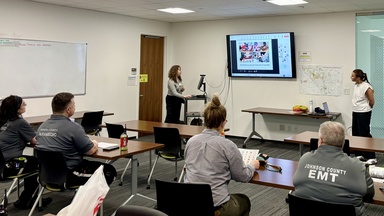By: Teja Pritchard
Graduate students in the Department of Communication Sciences and Disorders in the College of Liberal Arts and Sciences recently provided in-person and online training to the Johnson County Ambulance Service.
The training was part of clinical professor Krista Davidson's Augmentative and Alternative Communication (AAC) community outreach group. AAC encompasses various methods and tools used to supplement or replace spoken or written language for individuals who have difficulty communicating effectively.

This alternative communication method is crucial because it enables individuals with communication difficulties to convey vital information quickly and accurately about their condition, pain, medical history, and needs, directly affecting the speed and effectiveness of care. For this training, low-tech communication boards were used in combination with Davidson’s app, RescueVoice, which she developed last fall.
The app aims to improve communication between first responders and individuals with limited speech during emergencies.
“First responders now have the option to use the low-tech paper-based communication boards or the RescueVoice app when they run through the scenarios we provide,” Davidson explained. “The vocabulary on both the communication boards and RescueVoice was informed by feedback from first responders.”
Davidson formed the AAC outreach group in 2022, inspired by her involvement with the United States Society for Augmentative and Alternative Communication (USSAAC).
“Within that organization, I heard that there was a gap in educating first responders about the needs of individuals with speech disabilities,” Davidson said. “My husband worked as an EMT and volunteer firefighter for 12 years, so I thought it would be a good fit for me to bridge those two worlds. I also knew it would be a wonderful opportunity for our SLP students.”
The outreach group has connected with a wide network of first responders and community services to share practical AAC knowledge.
Morgan Linneweh, one of the graduate student presenters, explained how she and others explained to the group what AAC is, as well as how and when it can be used. Participants then received hands-on and virtual training using scenarios.
“SLP students presented to various groups of people, including firefighters, paramedics and EMTs, paratransit services, and anyone else in the community who wants to learn more about AAC,” Linneweh said.
During these training sessions, first responders can simulate emergency scenarios where one person assumes the role of a patient or victim, and the other acts as a first responder, presenting the system. Their goal is to gather essential information about the emergency by communicating with the "victim" who is using AAC.
Typically, two to three such scenarios are conducted per presentation, and responders consistently show increased confidence in their ability to utilize AAC.
“This hands-on learning is the highlight of the presentation, and I feel first responders get a lot out of it,” Linneweh said.
The impact of the trainings has been clear, according to feedback from emergency personnel.
“I can tell we're making an impact on how first responders interact with individuals who use AAC or who can't speak orally because they have given us that feedback both during and after the training,” Davidson said.
The AAC community outreach group has steadily grown since its inception.
“We continue to present to more groups and in more towns—it’s slow but steady,” Davidson said. “Attendance varies, and we often have some participants attending online while others are in person. Since they are first responders, they sometimes get called away during presentations, but we plan for that.”
For Linneweh, the outreach work has been meaningful by connecting classroom learning to real-world impact and community service.
“Being part of the AAC community outreach group has been such a fulfilling experience,” Linneweh said. “It was the first thing I got involved in as a graduate student, and I'm incredibly happy I joined.”